An Interactive Whiteboard is a very flexible display system where the interactive
design has been optimized to provide enhanced user experience. This device
usually projects images that are stored in the computer and gives more control
to the user to manage the onscreen activities with their fingers, stylus or a
pen. It also enables the user to create files of different formats like PDFs,
PPT and HTML images that can be easily added to a presentation for a corporate
seminar, or can be integrated into mails and even displayed on websites.

What
started out as an initiative to help teachers to deliver their content in the
classroom in a fluid, systematic manner, has now become an absolute
technological necessity in the Government and Private Corporate sectors. The
reason for this is quite understandable. The Interactive Whiteboard enables the
presenter (whether at a classroom or a boardroom) to experiment with different
alternative modes and make any topic more interesting with graphical images of
statistics and data. Technavio created a report called The Global Interactive
Whiteboard Market 2014- 2018, which outlines that the revenue of this
technological system will grow at a compound annual growth rate of 15.95% by
the year 2018. This report basically investigates the use of this product in
three main levels: the Government sector, the Private sector and the Education
sector.
The
British Education Suppliers Association reported that in the year 2004, 26% of
primary schools used interactive boards in the classroom. And now at least 73%
of schools in the UK have at least one interactive whiteboard. In the US, it
has been reported that 557,000 interactive whiteboards had been shipped to
different schools in 2008. The convenience of spreading education through modern
technology, the commencement of different government initiatives and the
technological boom in developing economies like India and China have fuelled
the popularity of interactive whiteboards.
Research
proves that interactive whiteboards lead to significant gains in different
sectors, by mediating interactivity and fostering participation. Technological
assistance is a prime factor in achieving progress, and the use of interactive
whiteboards is expected to become even more significantly popular in days to
come.
Previous:Bett Brasil & Educar 2015